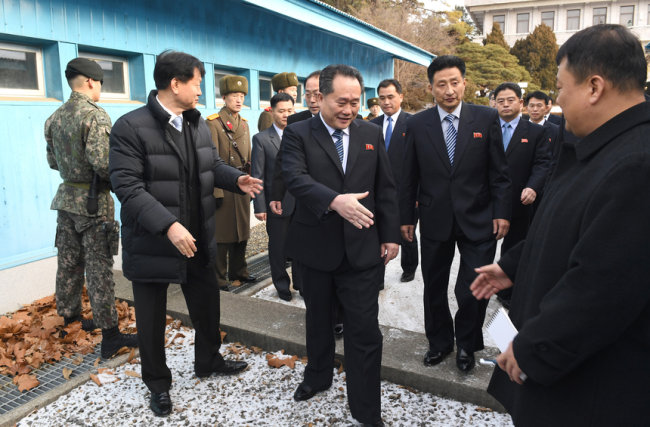The first inter-Korean meeting in two years held Tuesday aimed to alleviate tension on the Korean Peninsula. It ended with the release of a three-point joint communique after 12 hours of negotiations, but experts are expressing concerns that goals were only met “halfway.”
 |
Ri Son-gwon (center), North Korea`s chief delegate, crosses the military demarcation line in the truce village of Panmunjeom to shake hands with the South Korean delegation on Tuesday. (Yonhap) |
Although South Korea’s efforts to bring the North to the Winter Games bore fruit, with Pyongyang agreeing to dispatch high-level delegates, athletes, a cheerleading squad, a taekwondo demonstration team and a group of observers, other issues were overshadowed by the sporting event.
“It was generally a meeting that progressed within a frame set at the beginning of the talks,” Koh Yu-hwan, a professor at Dongguk University in Seoul, told The Korea Herald.
At the beginning of the talks, South Korean Unification Minister Cho Myoung-gyon and his counterpart Ri Son-gwon, the North’s chairman of the Committee for the Peaceful Reunification of the Country, hinted that turning the Winter Games into a “peace festival” would be the main focus of the meeting. But Seoul had also hoped to raise the North Korea denuclearization issue.
“Although the North’s participation in PyeongChang is important, what comes after the Olympics is also of paramount importance. Tensions surrounding North Korea’s nuclear issue have been temporarily alleviated (with the meeting), but not completely resolved -- the issue is expected to resurface after the Olympics,” Koh added.
The meeting kicked off in a relatively cordial mood, with the two chief delegates of the two Koreas exchanging warm New Year’s greetings and reminiscing about the times when ties were cozier in the early 2000s.
Yet, the mood shifted when Ri reportedly expressed “great discomfort” toward Seoul’s mention of denuclearization. North Korea has been pursuing a nuclear weapons program amid the international community’s increasing sanctions.
The Moon Jae-in government has been pushing for dialogue in its efforts to bring about the denuclearization of North Korea.
Talks involving other key issues such as the reunion of families separated by the1950-1953 Korean War were also left out of the statement, indicating that the North had snubbed the offer, at least for the moment.
“President Moon Jae-in mentioned in his Berlin initiative in July 2017 that the four pillars of the talks with North Korea would be PyeongChang, inter-Korean military talks, denuclearization, and the reunion of separated families,” Shin Bum-cheol, a professor at Korea National Diplomatic Academy, said pointing out that not all issues were able to gain attention at the discussion table.
The joint statement also underlined that issues surrounding the Korean Peninsula should be resolved -- but by only parties “directly involved” in the matter.
“It is well-known that North Korea wants the US to stay out of inter-Korean affairs,” Koh commented. The Seoul-based expert said South Korea will need to closely communicate and cooperate with the US to balance its ties with its ally and the North.
In his New Year’s address Wednesday, Moon reiterated his commitment to working with the international community to achieve North Korea’s denuclearization, saying that he welcomed the revival of inter-Korean dialogue, but that he has no intention of easing sanctions against the North.
Koh and Shin agreed that the meeting was successful in terms of taking the “first step” toward easing long-stalled ties, with both sides agreeing to hold further meetings to address other issues as well.
“PyeongChang could also act as a platform to show that South Korea is capable of aiding the US in restoring Washington-Pyongyang dialogue channels -- which could eventually lead to the possibility of denuclearization,” said Shin.
Koh also noted that North Korea has often tied matters related to separated families with cross-border tours to Keumgangsan, indicating that the issue could resurface later.
By Jung Min-kyung (
mkjung@heraldcorp.com)








